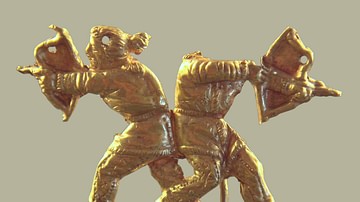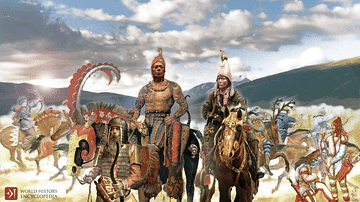Search
Did you mean: Osiris?
Summary 
Loading AI-generated summary based on World History Encyclopedia articles ...

Image
The Revenge of Tomyris
The Revenge of Tomyris by Michiel van Coxcie (c. 1620 CE). On display at Akademie der bildenden Künste, Vienna. Tomyris was queen of the Massagetae who successfully defended her people against a Persian invasion led by Cyrus the Great...

Image
The Vengeance of Tomyris
The Vengeance of Tomyris, by Peter Paul Rubens, 1620-1625 CE, Salon d’Apollon, Grands appartements du Château de Versailles, France

Definition
Scythian Warfare
Scythian warfare used state-of-the-art recurve bows and hit-and-run tactics against set infantry formations. Working from nimble horses, Scythian warriors could unleash a cloud of lethal arrows. Known, too, for their innovative use of scale...

Definition
Cyrus the Great
Cyrus II (d. 530 BCE), also known as Cyrus the Great, was the fourth king of Anshan and the first king of the Achaemenid Empire. Cyrus led several military campaigns against the most powerful kingdoms of the time, including Media, Lydia...

Definition
Scythians
The Scythians were a nomadic people whose culture flourished between the 7th and 3rd century BCE in a territory ranging from Thrace in the west, across the steppe of Central Asia, to the Altai Mountains of Mongolia in the east. This covers...

Definition
Medes
The Medes or Medians were a group of Indo-Iranian-speaking people from central Asia who migrated westwards and entered northern Iran around the end of the 2nd millennium BCE. They settled in the highlands of Zagros (Zagreus in Greek) and...

Article
Scythian Women
Scythian women garnered leadership roles and a raised level of status in their day, which is perhaps without parallel until recent times. While many female figures rose to pivotal roles in history, their rise was not a reflection of systemic...

Article
Scythian Territorial Expanse
With 7600 perimeter miles (12,231 km), the Scythians roamed and ruled over an astonishing 1.5 million mi² (2.4 million km²) of territory between the 7th and 3rd centuries BCE. Although building an empire was never in their interest, Scythian...
